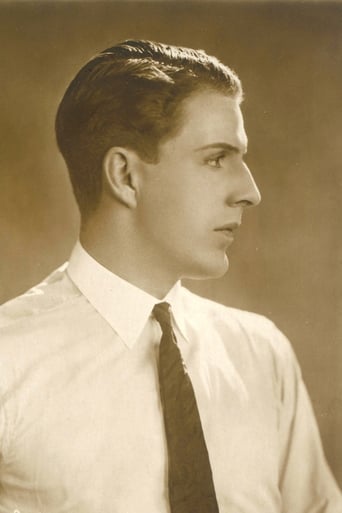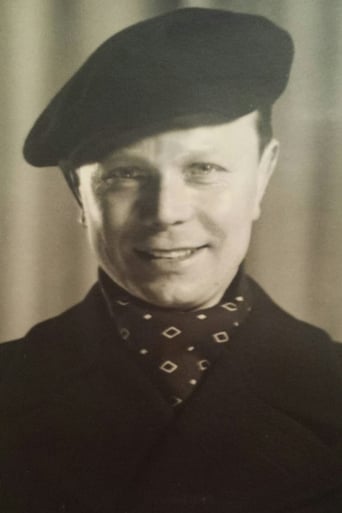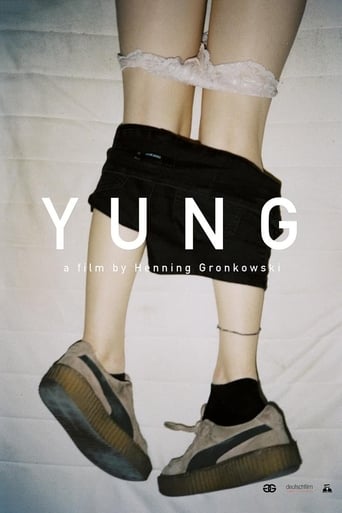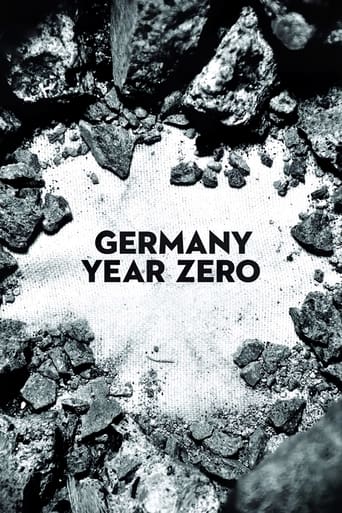
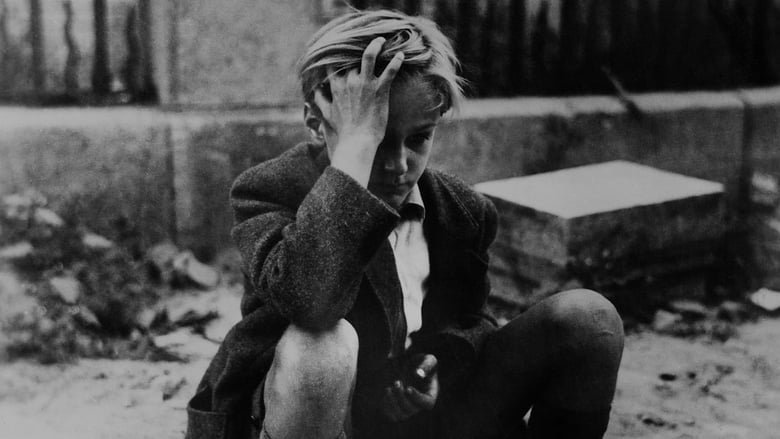
Germany, Year Zero (1948)
In the ruins of post-WWII Berlin, a twelve-year-old boy is left to his own devices in order to help provide for his family.
Watch Trailer
Cast


Similar titles
Reviews
it is the right choice to admire it from the artistic perspective. but this represents one of many options. and, maybe, the useful way to discover this special film is the reflection of near reality. not only in the context of the WW II. because the message remains painful because it is a slice of contemporary reality. because the purposes - survive and need to impose the rules against society rules is the same. nothing different. nothing out of well known forms. and this does a gem of neo-realism more than a good example of cinema. but support for see , in profound manner, the near every day reality. to understand. the war, the survive, the situation of a boy among the shadows of war, the meanings of year zero for the conflict zones, the hope as more than noble emotion.
This propaganda docudrama captures life in post-World War II Berlin, with real footage of the boomed out city. We see life through the eyes of a 13-year-old boy, Edmund (Edmund Meschke). He and his family live on rations; what little work there is to be had; what they could find in the streets (coal, potatoes, etc.); and the black market. Unemployment is extremely high. Each family is given their ration cards based on the number of persons in the family. However, Edmund is too young to work, his father (Ernst Pittschau) is too sick, and his older brother, Karl- Heinz (Franz-Otto Krüger), is afraid to come out of the house, anticipating that he will be sent to a concentration camp as an ex-Nazi rather than a German soldier. His older sister, Eva (Ingetraud Hinz), is working at a club to entertain allied soldiers. Edmund fears that she is prostituting herself, as other girls at the club do, but she assures him she isn't. When Edmund's father is able to go to the hospital, the household food situation lightens a bit when his father's food and medicine are taken care of. Edmund continues to secretly work at night, selling, bartering and scrounging the street. When he sees his old school teacher, the teacher has him sell things for him (including Nazi memorabilia); people are more likely to buy from young children than adults. The film makes it clear that, at this time in Germany, men are the least marketable group. In fact, the job marketability of men, women, and children is turned upside down from the usual peacetime levels.Don't expect great quality images in this film. In fact, some images are shot directly INTO the sunlight, leaving the people in the foreground as shadows (rather than subjects) of the overexposed background. But, in spite of the film's technical limitations, this Italian neorealistic work is effective and moving, and the ending is shocking. However, it is strange to hear Germans speaking Italian. I constantly had to remind myself that this is about Germans—not Italians. Such is the nature of foreign docudramas for me. This is SO close to a documentary that I think the characters—who WERE German--should have been speaking German. In any case, I would have been reading subtitles in either case. Still, the SOUND of German would have made the film even more authentic to me.
Berlin the immediate aftermath of World War II. (Kids, that would be about 1947.) The city is a wreck, with only the essentials of life available. Food is difficult to come by. Bits of clothing are valuable. Rosselini follows the fortunes of one family living in an apartment that makes even mine look good.Papa is sick in bed, suffering from malnutrition and devitaminosis. He's not filled with despair exactly but there are times when he wishes himself to be out of the way. It's a family of four but they are trying to survive on only three ration cards because his older son, who fought the war to its bitter end, is afraid to turn himself in, despite reassurances from others that he won't be punished by the Allied occupation authorities. He's in his 20s and he's bitter as hell about it all. There is a blond daughter too, and she takes care of Papa when she's not out banging soldiers for a few cigarettes.But the story centers about Edmund, the younger son, who is about twelve years old. He's just at that age at which people begin to form a more enduring pictures of themselves but his particular self image has a multitude of lacunae. He absorbs what values and ideas he can from his family but they're all screwed up by poverty.Then, among his Dickensian adventures, Edmund runs into his former teacher, who does him little favors and caresses his cheek lasciviously. Herr Professor seems to have a thing going with a stern, authoritarian figure who apparently has a thing going with several young boys.The teacher is not merely a pimp but a philosopher and as he guides Edmund around through the streets that have only recently been cleared of broken granite, he begins to spout a kind of Social Darwinism, as much to himself as to Edmund, and without passion or even much conviction. You know, the weak must die and get out of the way for the strong; the survival of the fittest; dog eat dog; it's a zero sum game.Edmund, though, is a kid and he takes this bushwa seriously because he doesn't know the difference between philosophy and everyday life. Shakespeare, for what it's worth, new the difference. In "The Merry Wives of Windsor," he has Falstaff remark sarcastically, "There never was philosopher could bear the toothache patiently." But Edmund is too young to know. So he goes home, poisons Papa, and the old man dies. No one knows what Edmund did, so he's taken aback by all the grief shown by the family and the neighbors. Not that the sadness of Papa's passing prevents the neighbors from speculating about what will be done with Papa's shoes.There is also the problem of the body. What do you do with a corpse when you don't have money for a casket, let alone a funeral? You can't just let it lie there. (For me, the most horrifying episode on "Crime and Punishment" was when a man dies in Raskolnikov's apartment house and, the family having no money, the body deteriorates and causes a smell.) The neighbors haul the body out onto the balcony and leave the family to deal with it.I wonder if, in a way, the story of Edmund's development is not meant as a summary of the evolution of Germany before, during, and after the war. He begins as a naif. Then, under the tutelage of a reckless and unthinking lunatic, he embraces a dangerous philosophy. And then he suffers the same fate as his nation.
This movie is a masterpiece. Some other movie critics may tell you better what is neo-realism and such things. I will not do it, instead I will tell you why I liked so much this movie.In the beginning of the movie, the voice of Rosselini says: Something must be done to change what these German kids think of life, or else they will love nobody. The kid (main character) has only seen terror and misery his whole life. Before the end of the war, his father tried to take his name of the Führer youth, but the kid betrayed his father saying that the document was false. He did it because all the society, including his teacher (Herr Enning) was pro-nazism.The housekeeper, Herr Kanengaard says that it would be better the kid's father die, because he is sick. The father says he should die, because he is sick and tired of being a obstacle in their lives. Finally the teacher says that it would be better if the father died, and starts preaching the same concepts that made nazism kill millions of people during the war. That the young and health should eliminate the old and worthless. The stronger must subdue the weaker, that's how nature works. Then the kid poisons his own father. That's what I found genial in the movie, Rosselini shows the perversity of nazism, even after the war, without any cannon or bullet fired, without showing any concentration camp.Later Edmund shows to be just a child, running and playing, and he did only what he was told to do, but now the teacher said he is a monster. He keeps playing and fooling around, but then when he realizes the suffering he would have the burden of his life would be too heavy to carry, he kills himself. That's the time when I shivered and cried.


